In general, the vibrant larkspur blooms represent romance, love, and closeness with a person. But their various shades can also convey different meanings.
For instance, blue larkspurs mean dignity and grace, white means lightheartedness and purity, yellow suggests cheerfulness and humor, and purple means sweet and tender love. However, the pink ones are a negative symbol of deceit and betrayal.
Read this handy guide further to know more about the larkspur flower. Among the things we will discuss are its basic botanical info, other meanings, and medical uses!
Basic Information about Larkspurs
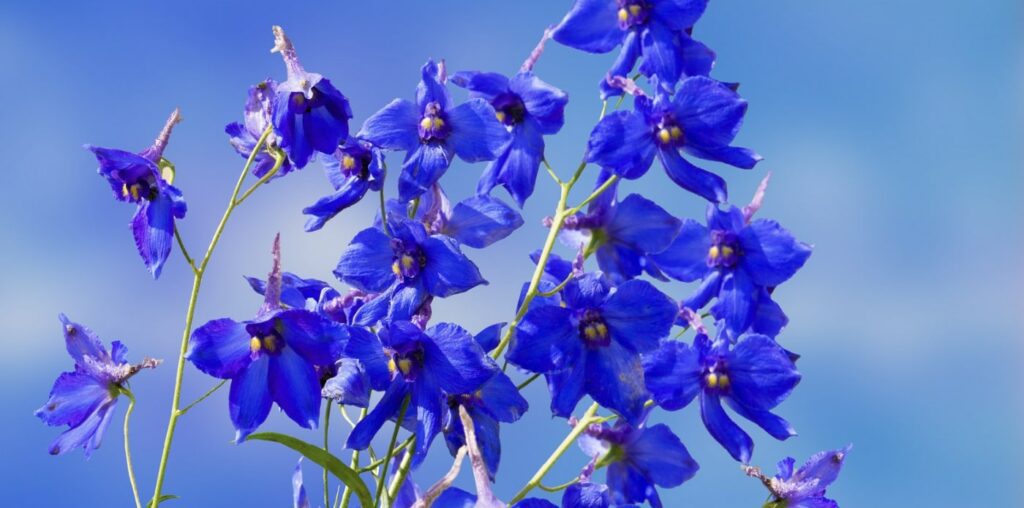

Genus: Delphinium
Family: Ranunculaceae
Other Names: Lark’s Claw, Lark’s Heel, and even Knight’s Spur
Native Habitat: Northern Hemisphere including America and Europe
Blooming Time: From June to July
Uses: Ornamental and cut flowers
The herbaceous larkspur is part of the family Ranunculaceae, along with other buttercup flowers. These cup-shaped blooms come in 365 varieties.
They’re also commonly called delphiniums, which is the name of the genus that they belong to. Its other names are Lark’s Claw, Lark’s Heel, and even Knight’s Spur.
The larkspur flower is native to many countries throughout the Northern Hemisphere, including America and Europe as well as some mountainous areas of Africa.
The flowering season of larkspurs occurs during June and July, but a second flush of flowers in August and September will bloom if they’re pruned or cut back properly.
Also, these are often grown as beautiful garden ornamentals and cut flowers for decoration or special events.
Physical Description of Larkspurs
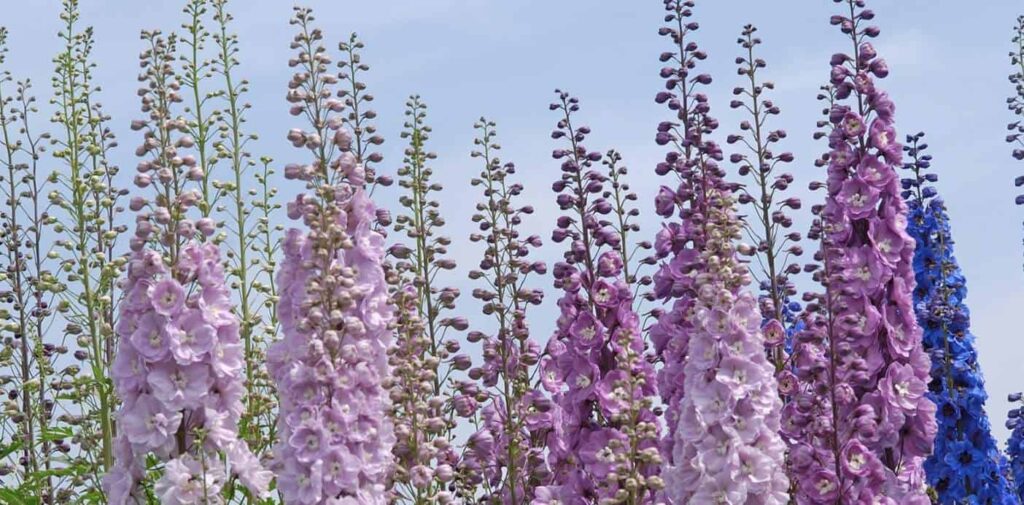

A remarkable feature of larkspurs is their dignified spikes of vertical flowers growing on the upper part of the stalk.
They usually have five outer sepals and four inner petals with a nectary at the back of the sepal. This is said to resemble the shape of a lark’s claw, and hence the name.
And below the line of flowers is ferny and lush foliage that perfectly complements their graceful beauty.
Larkspurs can reach 3 to 4 feet and 1 foot across when they become mature. So they’re very easily seen in the garden along with other perennial or annual plants you have.
They come in a variety of hues like purple, blue, pink, red, yellow, and white.
Larkspur Word Origin
The word larkspur was first used in the last half of the 16th century. It accurately describes the nectary that resembles the angled and sharp spur or claw of the lark bird.
Now that’s one piece of the puzzle solved. Let’s discuss its other name delphinium.
Its root word is the Ancient Greek word δελφίνιον (read as delphínion). The shape of the elongated, protruding part of the blooms is also often compared to a dolphin’s hind.
Larkspur Meanings
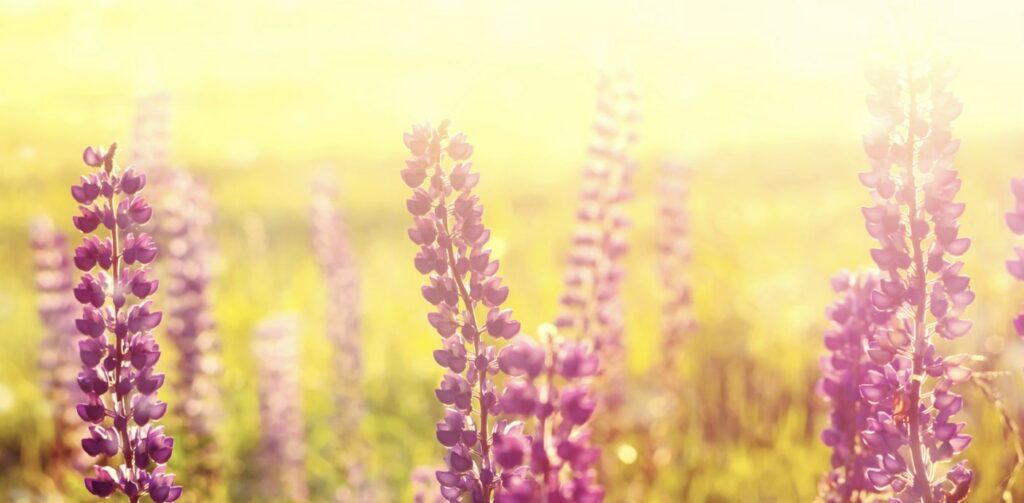

These attractive, dolphin-shaped flowers express open-heartedness and ardent love for someone as well as frivolity and cheerfulness. Besides that, it can suggest having a big and pure heart.
Plus, along with the water lily, the larkspur is the birth flower of people born in July. Both of these gorgeous flowers balance each other, as the first symbolizes peace, rebirth, and enlightenment, whereas the second expresses beauty and grandeur.
Larkspur Flower Meaning by Color
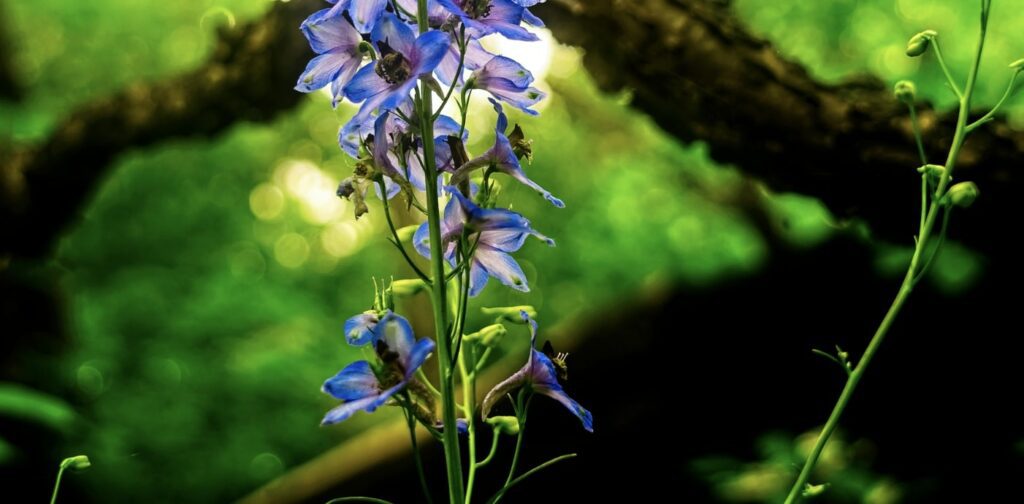

Here are the certain meanings of the larkspur flower according to its color:
Blue Larkspurs Meaning
Blue larkspurs can be anything from lavender blue all the way to purplish blue and deep vibrant blue.
Generally, the blue variety stands for grace, dignity, and optimism. You just can’t help but feel uplifted, confident, and cool when beholding blue larkspurs.
And so, the flower is well-suited to be given to someone you love and respect, like a close friend, a faithful lover, or a supportive mentor.
Purple Larkspurs Meaning
Do you remember your first crush? Then, you might want to surprise them with a bouquet of purple larkspurs, as it’s a symbol of first love.
When beautifully crafted in a bouquet, larkspurs shoot up in all directions, just like fireworks in the sky, making your love for them even sweeter.
What’s more, purple is a special color that means chivalry, gentleness, and nobility. The willingness to win their heart by proving it is very romantic and noble indeed.
White Larkspurs Meaning
Because of their flower shape and structure, white larkspurs somewhat deviate from the standard meaning of white flowers.
White larkspurs are taken to mean a carefree, unworried spirit. Though this person can have problems in their life, they try their best to remember the beauty and good things in life they have and take on the problems as they go.
If you know someone who tries to be cheerful and positive in good and bad times, then white larkspurs can be a great gift!
Pink Larkspurs Meaning
Unlike most larkspur shades, pink is primarily regarded as a negative color for delphiniums. It represents a softness of heart and emotions, betrayal, and unfaithfulness.
In other words, pink larkspurs stand for the kind of people that negatively change or betray someone.
Red Larkspurs Meaning
Red is one of the rarer color varieties of this plant. Red larkspur, like that of the Delphinium nudicaule, signifies a burning and passionate love for a beloved.
As for whom to give red larkspurs, it’s most certainly someone you love deeply and wholeheartedly.
Yellow Larkspurs Meaning
The eye-catching yellow larkspur is extremely lovely and suggests cheerfulness, humor, laughter, and friendship. They embody the qualities of someone who is loving, fun, and outgoing.
It can brighten the day of everyone that sees it, whether that be a family, a pedestrian, or a sick person in the hospital.
And, not to mention, these flowers paint the garden landscape with their exciting and bright color during the summer.
The Larkspur and Its Cultural Relevance
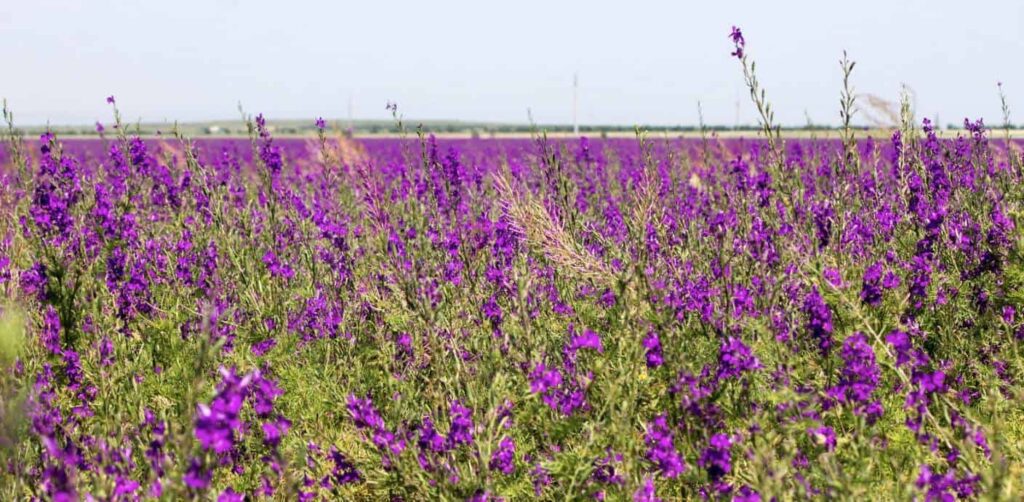

The larkspur has been a relevant flower across eras, religions, and countries. Let’s take a look at some of them:
In America
A Native American legend tells that there was a divine being that came from above and split the sky open a long time ago. He made spikes out of the sunlight and sent them down on the land.
The rays of the sun scattered, and out of the spots they landed came larkspurs.
In Christianity
There’s a wonderful Easter story about how the larkspur came to be. It takes place at the twilight of Good Friday after Jesus died on the cross.
By that time, his dead body was already taken down from the cross and transferred to the tomb. It was locked by a heavy boulder and sealed with a Roman army crest.
One Easter legend says that a bunny stayed and waited faithfully inside the tomb for Jesus to come back to life.
Two days later, on Easter Sunday, Jesus rose from the dead. And the rabbit was very delighted to see him.
Jesus then gave it a sprig of larkspur, and for its faith and love, he made the center of the larkspur to have an image of that exact bunny.
And so, today when Christians see a larkspur flower, they can be reminded of this little bunny that had been loving and faithful to Christ and found that the promise of his resurrection came true.
In other words, to Christians, the larkspur flower is symbolic of forever trusting in God.
In Greece
In Greek mythology, after the death of demigod Achilles, Odysseus and Ajax were on a mission to get the arms of the fallen great warrior.
When the Greeks handed the arms to Odysseus, Ajax became furious and killed himself with his sword there and then. Blood spilled forth where he died, and from there grew majestic larkspurs.
What does a larkspur flower tattoo mean?
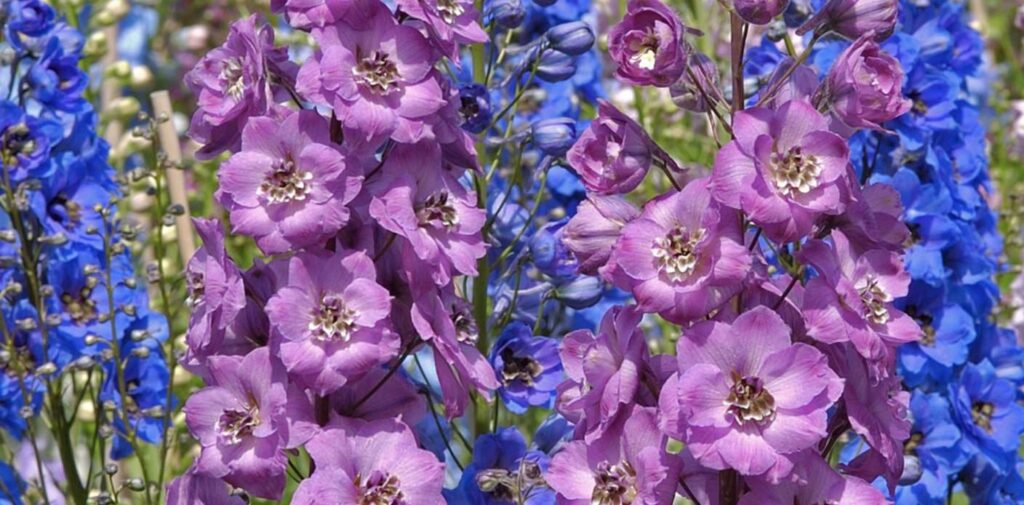

Larkspur flower tattoo means that the person who has gotten it loves joy, laughter, and life. In other words, they’re a lover of life and love to share happiness where they are.
Moreover, the tattoo means an open heart, a sweet disposition, and first love. So the person may have one or more of these qualities or the desire to have them.
And as this flower is one of the two birth flowers of July babies, most people who get this flower tattoo are either born in July or are parents whose children are such.
The Larkspur Flower and Its Uses
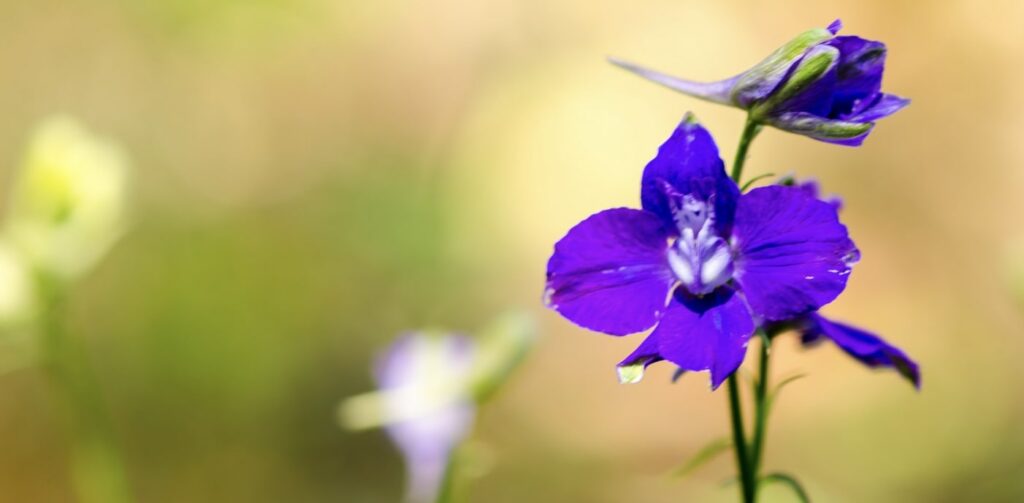

Delphiniums are very toxic and harmful for humans to consume. It can result in low blood pressure, lung failure, and a slow heart rate.
Still, the flower and its leaves have been used limitedly as medicine or drugs to treat a wide range of health issues both in the past and present, such as
- Fever
- Insomnia
- Stomach worms
- Hydration
- Poor or no appetite
- Depression or anxiety
- Body pain
- Cancer



